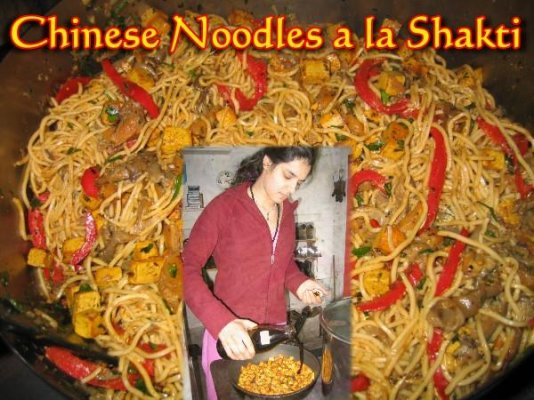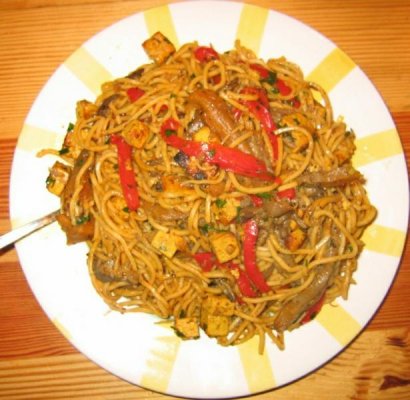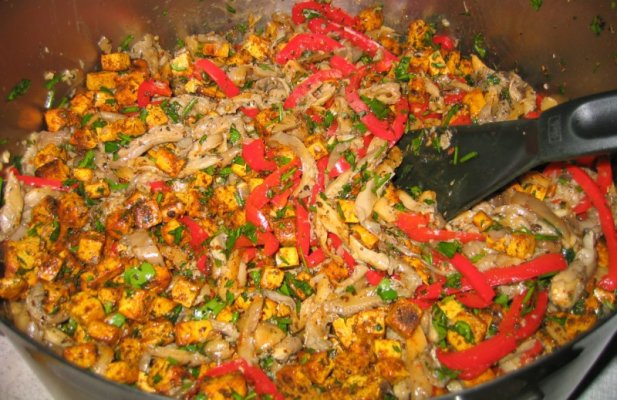eiasu
Cook
Hallo,
here another question about the cooking book i am taking care of:
many time in the book there is this expression "cooked through"
but sounds like a term adapted from German and not really a common english expression,
can you tell me another way to say it?
I put below one of the recipes containing this expression:
[FONT=Calligraph421 BT, cursive]Chinese noodles a la Shakti[/FONT]
[FONT=Calligraph421 BT, cursive]easy and spicy[/FONT]
Spice the tofu with the sweet paprika, the oregano and the curry.
Fry the bell peppers in a pan until cooked through but still with
some “bite”.
Put the peppers in a big mixing pot.
Fry now shortly the garlic and the ginger in oil, then add the mushrooms, when the mushrooms are cooked through, add 75 ml sherry and put everything after a short while into the mixing pot.
Fry one layer of tofu in a pan with oil until it's nicely brown.
Pour about 50 ml of soya sauce over it and stir the tofu until the soya sauce has evaporated.
Repeat procedure with all the tofu.
Add the tofu into the mixing pot.
Add the cashew nuts, the parsley, the chilli and the spring onions in the mixing pot, mix everything well.
Cook the Chinese noodles in salted water, that you have brought to boiling before. Cook them until they are done, strain them and add the noodles in the pot.
Mix everything well with the sesame oil, the rest of the sherry and soya sauce.
That's it, enjoy!
here another question about the cooking book i am taking care of:
many time in the book there is this expression "cooked through"
but sounds like a term adapted from German and not really a common english expression,
can you tell me another way to say it?
I put below one of the recipes containing this expression:
[FONT=Calligraph421 BT, cursive]Chinese noodles a la Shakti[/FONT]
[FONT=Calligraph421 BT, cursive]easy and spicy[/FONT]
- [FONT=Calligraph421 BT, cursive]½ kg Chinese noodles[/FONT]
- [FONT=Calligraph421 BT, cursive]3 red bell peppers, quartered and cut in thin slices[/FONT]
- [FONT=Calligraph421 BT, cursive]700 g tofu, 1 cm cubes[/FONT]
- [FONT=Calligraph421 BT, cursive]700 g oyster mushrooms, thin slices[/FONT]
- [FONT=Calligraph421 BT, cursive]3 tbsp ginger, chopped[/FONT]
- [FONT=Calligraph421 BT, cursive]3 tbsp garlic, chopped[/FONT]
- [FONT=Calligraph421 BT, cursive]200 g cashew nuts, roasted[/FONT]
- [FONT=Calligraph421 BT, cursive]3 chillies, finely chopped[/FONT]
- [FONT=Calligraph421 BT, cursive]1 small bundle parsley, chopped[/FONT]
- [FONT=Calligraph421 BT, cursive]2 spring onions, rings[/FONT]
- [FONT=Calligraph421 BT, cursive]ca. 200 ml soya sauce[/FONT]
- [FONT=Calligraph421 BT, cursive]ca. 150 ml sherry[/FONT]
- [FONT=Calligraph421 BT, cursive]3 tbsp curry[/FONT]
- [FONT=Calligraph421 BT, cursive]3 tbsp oregano[/FONT]
- [FONT=Calligraph421 BT, cursive]2 tbsp sweet paprika[/FONT]
- [FONT=Calligraph421 BT, cursive]ca. 60 ml sesame oil[/FONT]
- [FONT=Calligraph421 BT, cursive]oil[/FONT]
Spice the tofu with the sweet paprika, the oregano and the curry.
Fry the bell peppers in a pan until cooked through but still with
some “bite”.
Put the peppers in a big mixing pot.
Fry now shortly the garlic and the ginger in oil, then add the mushrooms, when the mushrooms are cooked through, add 75 ml sherry and put everything after a short while into the mixing pot.
Fry one layer of tofu in a pan with oil until it's nicely brown.
Pour about 50 ml of soya sauce over it and stir the tofu until the soya sauce has evaporated.
Repeat procedure with all the tofu.
Add the tofu into the mixing pot.
Add the cashew nuts, the parsley, the chilli and the spring onions in the mixing pot, mix everything well.
Cook the Chinese noodles in salted water, that you have brought to boiling before. Cook them until they are done, strain them and add the noodles in the pot.
Mix everything well with the sesame oil, the rest of the sherry and soya sauce.
That's it, enjoy!






